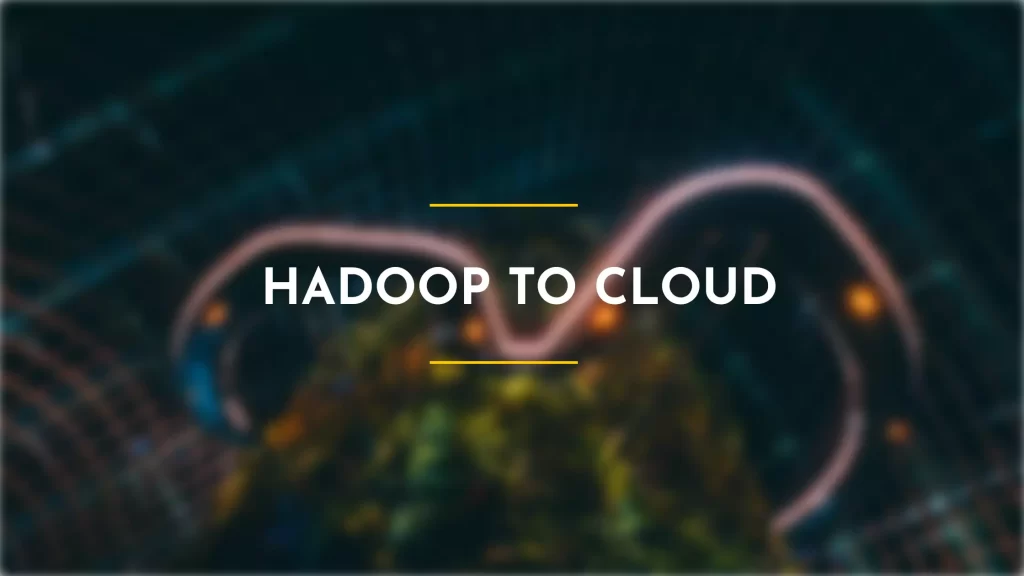The Time Is Now to Migrate From Hadoop to Cloud Alternatives

What is Hadoop?
Apache Hadoop is a collection of open-source software utilities that enables users to use a network of computers to solve problems that demand a significant amount of computation. Hadoop provides a software framework for big data processing and distributed storage. Hadoop is designed in such a way as to scale up from single servers to several machines each of which provides local storage and computation. Hadoop modules are designed with the assumption that hardware failures are unavoidable and should be handled by the framework.
Hadoop was introduced to deal with large amounts of data that could be used for big data applications. But overtime organizations are finding it difficult and complex to handle Hadoop.
Some of the reasons why people started bidding goodbye to Hadoop are
1) Accumulating of Scaling Costs
Separating compute and storage is not possible with an on-premise Hadoop-based environment. Hence costs keep on accumulating
2) Redundant Hardware Capacity
You cannot scale the capacity. Even though capacity sits idle and unused it does recur cost.
3) Software Upgrades
Software upgrades take a significant toll on your bandwidth, time, and on your day to day operations and often deliver very few functionalities
4) Slower Processing
In Hadoop, MapReduce processes a huge amount of data. It breaks the processing into phases namely Map and Reduces. MapReduce consumes a significant amount of time to perform these tasks and thus increases the latency.
5) Does Not Support Live Streaming of Data
Hadoop is a batch processing framework and hence takes a large amount of data as input to produce the final result after processing. Here the throughput is delayed significantly and hence Hadoop cannot be used for real-time processing.
6) Lack Of Security
Hadoop uses Kerberos for security which is difficult to manage. The network and storage encryption is missing in Kerberos which makes it more susceptible to potential security threats.
7) Processing Overhead
Hadoop deals with large amounts of data in the range of terabyte (TB) and petabyte (PB). This makes the read and write operations immoderate and leads to large processing overheads.
Shifting to Cloud Platforms
With the advent of better cloud computing services more and more Hadoop users are migrating to cloud services. Cloud offers advanced data processing capabilities for big data analytics and AI capabilities.
Benefits of cloud computing
1) Cost
Cloud services are based on a subscription basis thus you need to make payments only on a pay-as-you-go basis rather than making upfront investments. Most of the cloud services, especially the public clouds are based on a multi-tenant environment thus doing away with the need to maintain and manage licenses for your software. Unlike a traditional on-premise infrastructure you need not spend any money on maintaining the servers and associated hardware and their troubleshooting and repair. The entire onus of the management and maintenance of the associated infrastructure lies on the service provider. This also ensures that you don’t need to deploy human resources for the maintenance of data centers.
2) Big Data Processing Capabilities
Big data deals with huge amounts of data sets. Using your local host machine for such applications is impractical due to the huge amount of processing and time requirements. It is here that cloud solutions come in handy. Cloud solutions that are based on Infrastructure as a Service (IaaS) offer huge processing capabilities. These are charged only for the time and power that you use. One such tool which uses big data processing capabilities is the Google Cloud Platform (GCP) based Google Collaboratory or Google Colab. It can be used for Deep Learning (DL) applications which are used for training a type of neural network called Convolutional Neural networks (CNN) for image classifications. Google Colab enables the end-users to deploy GPUs based on remote locations for executing their DL applications with minimum downtime.
3) Better Data Security and Compliance
Cloud computing offers reliability as well as security of data. Vendors who are into cloud services offer best-in-class cloud management and support services. They provide good disaster management services like providing reliable backups in case something untoward happens. Most of the cloud services have inbuilt security features like encryption. Encryption ensures that your data cannot be stolen or used by malicious elements. Other security mechanisms that can be leveraged from cloud service include multi-factor authentication (MFA), firewalls, software patching, etc. Such security features can also enhance your client’s confidence in your services.
4)Scalability
Cloud services enable you to ramp up and down your storage, compute, and network resources based on your business requirements. It ensures that you do not waste your money and resources. You need not worry about having large storerooms that house physical hard copied files. This flexibility to adjust your workspace is the icing on the cake that makes more enterprises shift their workloads to the cloud.
Conclusion
Hadoop though was developed for big data capabilities could not offer the data processing and AI capabilities that could be offered by cloud platforms. Cloud solutions make it easy for end- users to create and execute AI applications based on Deep Learning which Hadoop could not address. Cloud solutions apart from offering better big data processing capabilities as compared to Hadoop could also provide several host of benefits like better scalability, ease of access, enhanced security compliance, etc.
Activelobby provides affordable customer service and technical support for cloud partners and users across the globe. The services we provide are extremely agile, making it easy to scale your team based on the size of the platforms. We manage and support all major cloud platforms such as Amazon Web services (AWS), Microsoft Azure, Google Cloud Platform, Alibaba cloud, We have disaster recovery mechanisms based on various disasters which are validated from time to time to ensure their compliance. Our in-house disaster management services thus ensure the safe upkeep of your critical data.
